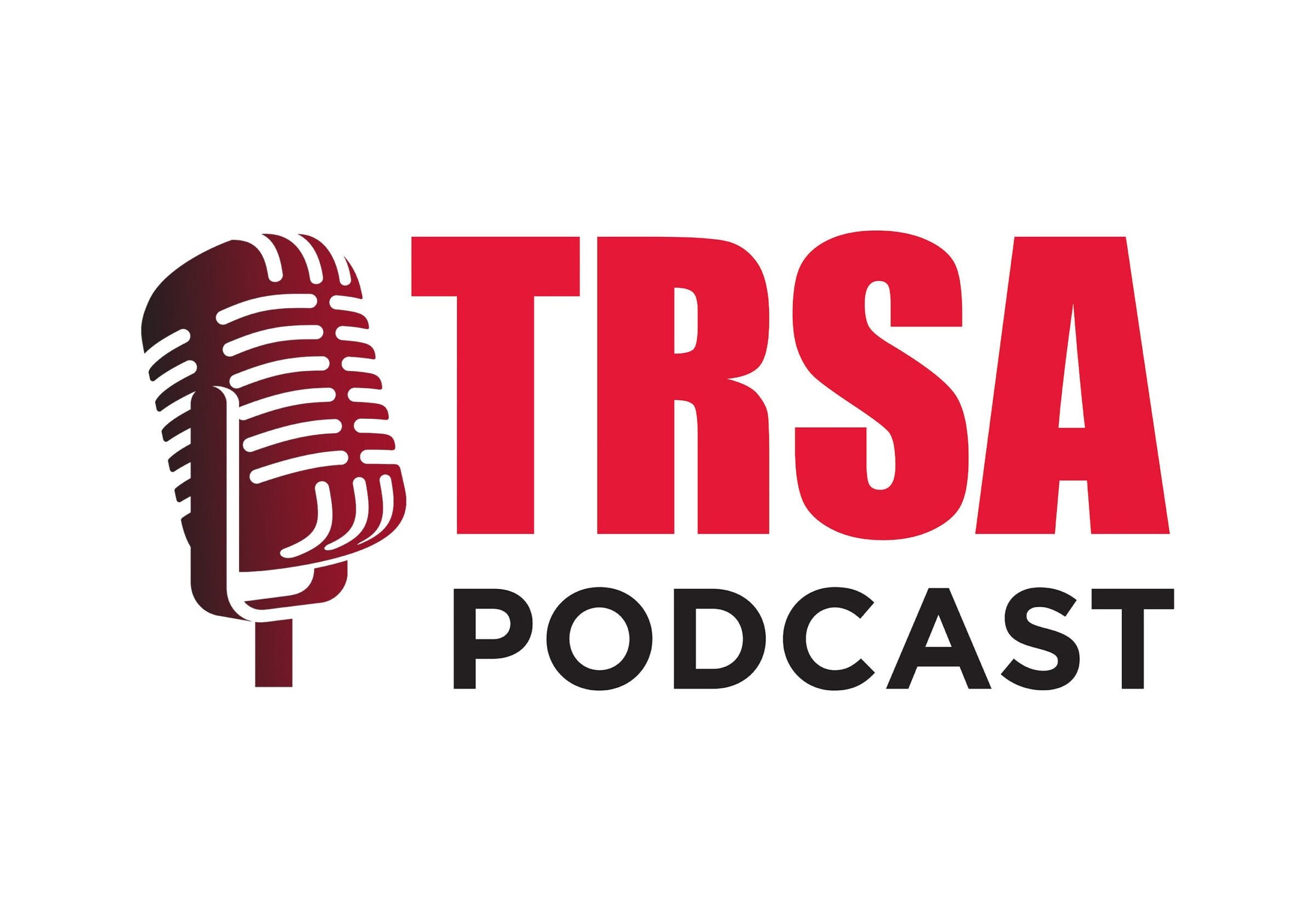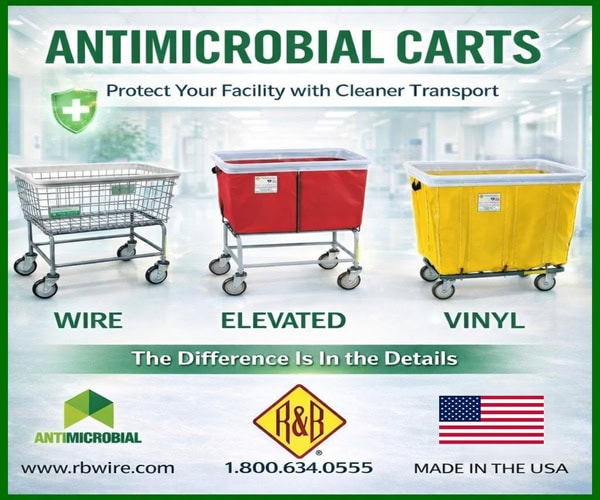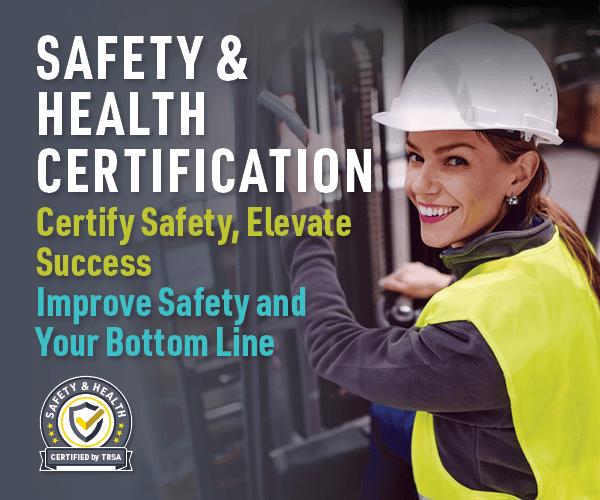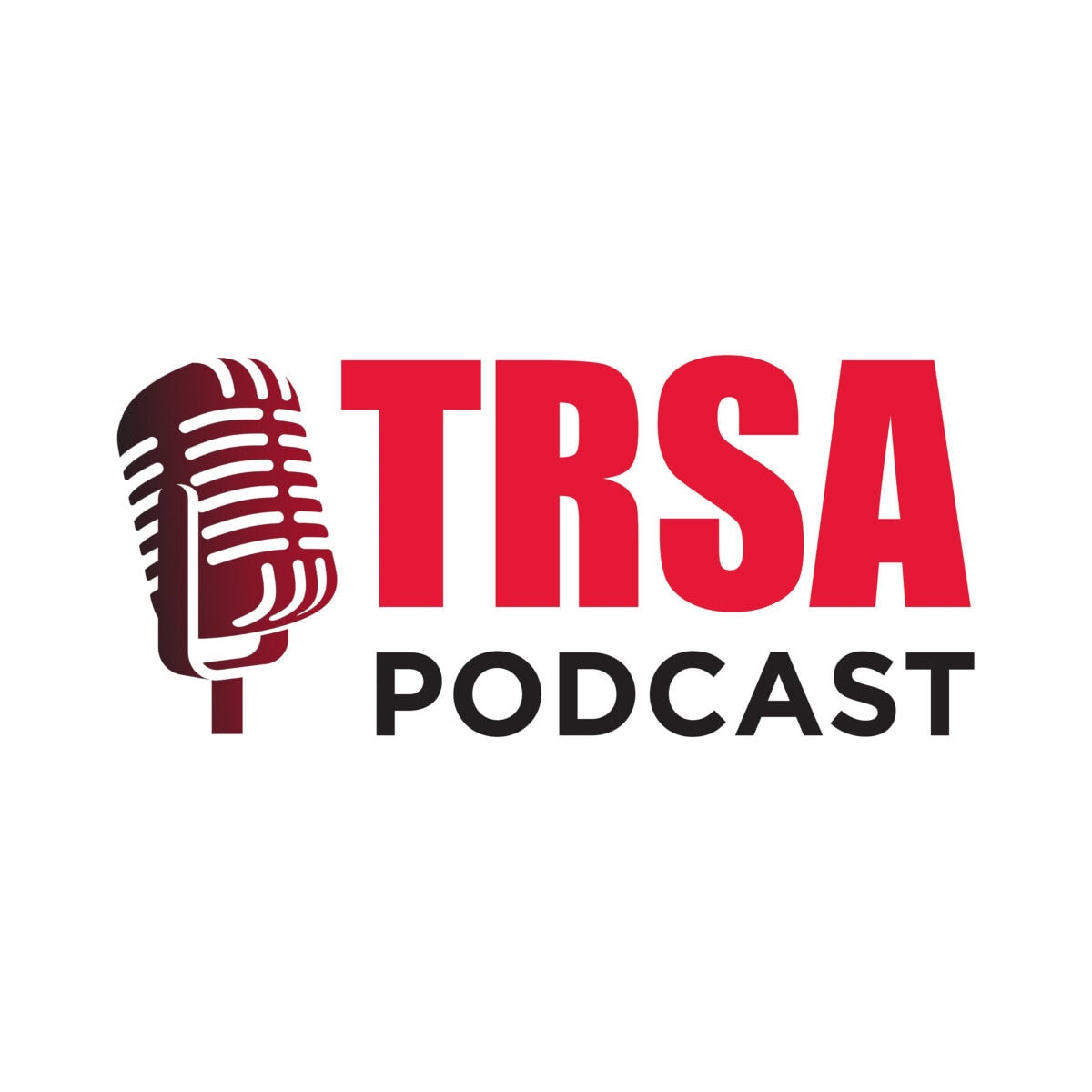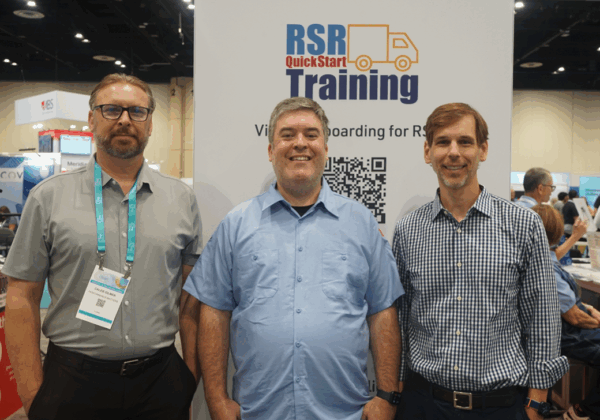 Currie Gilbert (pictured, right) and Caleb Gilmer (pictured, left) from Performance Matters discuss the need for route service representative (RSR) training in the linen, uniform and facility services industry, and highlight a partnership between TRSA and Performance Matters to fill that need through a program launched at the recent Clean Show in Orlando, FL. The two tailored RSR training programs include the following:
Currie Gilbert (pictured, right) and Caleb Gilmer (pictured, left) from Performance Matters discuss the need for route service representative (RSR) training in the linen, uniform and facility services industry, and highlight a partnership between TRSA and Performance Matters to fill that need through a program launched at the recent Clean Show in Orlando, FL. The two tailored RSR training programs include the following:
- RSR QuickStart Training, which is ideal for new RSRs
- RSR ProTrack Training, which is designed for experienced RSRs
For details on the program, click here. This podcast episode was recorded live from the TRSA booth on The Clean Show floor in Orlando, FL. View the video of the podcast below.

Jason Risley: We’re here live from The Clean Show. I’m here with Currie Gilbert and Caleb Gilmer from Performance Matters. What are your impressions of the show so far?
Currie Gilbert: Jason, thanks for having us. So far, The Clean Show has been excellent. It’s great to see a lot of clients, colleagues and friends. Orlando is an easy spot for us to get to on the East Coast, but it is a great opportunity to bring together so many in the industry that are really trying to move their businesses forward. And you see a lot of what everybody wants to have and some candy around from an equipment standpoint. To see what the newest innovations are is really cool.
Caleb Gilmer: I would completely agree. It’s always good to connect with industry friends, and also form new relationships. You know, kind of what we’re here talking about today. As a matter of fact, just to really dig your feet in and bring some better knowledge to the industry, which is what we’re really, really striving to do.
Jason Risley: There’s a lot of new technologies and innovations on The Clean Show floor. And speaking of new programs and innovations, we have an exciting partnership with Performance Matters. TRSA and Performance Matters launched the RSR Quick Start training program at the Clean Show here. Can you give us an overview of the program?
Currie Gilbert: Yeah. I’ll start, and then maybe, Caleb, you can fill in certainly with some color commentary. First of all, I wanted to thank TRSA for the opportunity to have this partnership. TRSA has worked tirelessly to really provide, I believe, to the members and to the industry, quality training, quality education, quality, obviously, from the advocacy standpoint. So thanks to, you know, everybody on the team from Joe to Ken to you guys, Jason, Cody and Susie. So many have been influential in bringing this to life. And so, really, what we’re most excited with this RSR Quick Start training program is to provide a platform, and a conduit to help the new route service reps give them the best tools, the best navigation, and support to be able to get onto a route efficiently, effectively, safely, and to be able to take that burden off of the operator so that they don’t have to recreate the wheel, but they can have quality training from industry experts through TRSA’s partnership, as an association, to provide the process to get a new route service rep on the route, and we’re really excited for that.
Caleb Gilmer: Yeah. I’d add to that a little bit, Currie. You look at the evolution of the business, textile businesses in general, and you used to have 30-, 40-year employees on the route. That’s obviously not the case anymore. Companies are growing, so there’s a need for new employees there adding routes, but it’s very frequently you find somebody out there in the industry that has that 30-year-old RSR. Right? So it’s constant turnover. One of the things that I personally like the most about it is you’ve got your set schedule of onboarding. Of course, they’re going to need to see the client, understand how things are going on. This is really more of a supplemental, right? You have your own schedule, but this can be done. It’s quick video segments, a couple of follow-up quiz questions that really support the things they’re seeing on a daily basis and why a company is doing the things they’re doing. But even more than that, I think it’s nobody really likes read and text and quiz anymore. So one of the things that Ray Shabandarian and myself, when we were creating this, is we wanted to make that interaction more than just a read and quiz environment and make it more of like a YouTube channel interaction, specifically because that’s what the younger generation really steers toward when they’re trying to learn something or how they get their information in general.
Jason Risley: The flexibility of the program is one of the benefits. So how will the program meet the needs of industry operators?
Caleb Gilmer: You want to go ahead, Currie?
Currie Gilbert: Sure. What we’ve heard from a lot of clients in the industry and TRSA has heard from the membership, there’s just been, again, the inability to really provide the best training for route service reps. And so we wanted to try and as TRSA came to us with a partnership, is how do we build something that is new but still has the nuts and bolts of what it means to get on route and do that really well from the start. So as organizations implement, the RSR Quick Start training, they should see that their reps are better prepared to get on the route, to get on the route safely, to run it effectively, to understand not just like, well, I went on Route 12 with Ryan and he does it this way, and then I went on Route 4 with Scott and he does it this way, and I’m a little bit confused. We want to give that baseline and an overall umbrella support so that they can get out there with the right tools to not get frustrated. Because as a new hire, if they’re frustrated, if they’re confused, then we can tend to lose them.
Caleb Gilmer: Yeah. I would completely agree, Currie. There’s a lot of times in the service industry in general, when you have a tenured rep of any kind, right, they find their best practices. And then if you have somebody that’s in training, they ride along with one individual one day, he does it this way to Currie’s point. The next individual does it a certain different way. So it’s kind of like, okay, we’ve got people that are finding their own way of efficiency, but really how can we convey to them in that startup role when you are wanting to go on a route, what are your job responsibilities so that you can concentrate on those and not have all that background noise of this guy does it that way or this guy does it that way.
Jason Risley: What are some of the lessons that RSRs are going to learn by going through this program?
Caleb Gilmer: Quite a bit. There’s about, I believe, around 55 lessons. And, you know, they’re going to learn anything from the general understanding of an invoice, right, which a lot of times in an onboarding that may or may not be explained. Right? The other thing I like about that, we actually assign them tasks. So for them to progress through the system, they actually listen to the video content. We give them a task, which might require a picture to be uploaded. Hey, this was my task. I went out. I saw this today. I uploaded that. And they can go to the next learning segment after that. So it’s very task oriented to make sure that they not just read or view that content, but that they execute it. So one of those things again would be understanding an invoice, which is a very general basic task, but who do you ask? What’s this ancillary charge? What do we call it? What’s it cover? And a lot of times when those RSRs from that perspective are asked that question from a customer and we try to get them on route right away, they don’t have an answer. So we give really clear direction in many of these segments of, these are some of the questions you’re going to be asked. You need to go to your trainer, you know, your route service trainer and understand what are my ancillaries, what do they cover and how I explain that to customers. That’s one example. Then other general areas, such as simple things like a load sheet, right? A bulk load sheet, mats, how to make sure that everything before I go on route is there and ready for me. And where do I go when and if I’m missing a product? Last thing we wanna do is be doing run backs. It’s not a cost effective way to do business. So we want to make sure that they understand that load sheet, that build process. Those are just a couple of examples of some of the content that’s in there.
Currie Gilbert: I would add just a little bit of color to that is the sequence of the training. So as Ray created this, and Ray Shabandarian, our director of service training, has done an amazing job of having the building blocks of a basic getting on a route. And so how do you do the introduction of why we’re doing this? Why do we have this? What is this industry about? If they’re coming from outside the industry, we’re like, well, what is this? And then you’re building it on how you’re building the truck, how you’re picking up certain types of linens or uniforms and dropping off the clean ones, how to, you know, again, from the invoice standpoint, how to handle customers. So, we find in the industry a common response can be, well, just call the office. And we really want to empower route service reps with the ability to answer a lot of those questions so that they can properly service their customer.
Jason Risley: How long will it take to complete the training program?
Currie Gilbert: The program’s set up for about a four to eight week cycle. So that’s the general cadence. We wanted to give an organization plenty of time, so about eight weeks or two months to be able to go through it. We’ll let them moderate that and kind of, run that cadence within their own, or every organization may dedicate a little bit more time to the video learning and the onboarding process. We’ll give them that amount of time to go through. So it could be anywhere from two weeks to a couple months as they work through it. They go through some training. They’re going to be on route. They’re probably going to be in different parts of the plant learning things, and we’ll be able to provide some guidance on that. But, each organization, I think, will mold that on their own.
Caleb Gilmer: Yeah. I would agree. Again, the videos, essentially, we wanted to not overwhelm them with, you know, here’s 52 or 55 videos to go through and watch, and you have to do it within a week. Right? So they’re learning a lot there. Again, to Currie’s point. They’re looking at how things were processed and loaded like, even packed and built and ready for route. The real objective, kind of the vision that Ray and I had, was give them something at the end of the day that they can kind of fill and just kind of, you know, that two or two and a half, three minutes at the end of the day. And if you do one of those every day at the end of being on route or whatever training was going on, it just adds to the content and the level of experience when they go out on route.
Jason Risley: And if operators are here at The Clean Show, they can sign up for the program today. For those that are not at The Clean Show, how can they sign up for the program moving forward?
Currie Gilbert: I would say the best way is to look for your TRSA announcements and go to the TRSA site for On-Demand Learning. And, you’ll see the RSR Quick Start training on there, and it’ll follow the links to, the learning management site. So it’s pretty quick. It’s pretty easy. We try to make this as simple as possible with a low barrier to entry and bring a lot of value to take away a pain point for operators out there that have continually had that from an onboarding standpoint.
Caleb Gilmer: We talked today with Susie, and we’re going to be getting her a general list of the classes, content of classes that I believe will be on the TRSA website within the next day or two as well. So that’s great.
Jason Risley: Well, Currie and Caleb, thanks again for joining me here live from The Clean Show floor. Really appreciate the time, and I’m looking forward to seeing the program move forward.
Currie Gilbert: Yeah, I’m excited. Can I ask you a question?
Jason Risley: Certainly, what is it?
Currie Gilbert: What’s been your highlight of The Clean Show so far?
Jason Risley: My highlight has been I’ve been seeing a lot of faces from the industry that I don’t get to see typically, but on Microsoft Teams or Zoom. So it’s really nice to come here and see some of my cohorts from EMI Year One. I just went through that program last week in Maryland. I’ve been seeing a lot of faces from there and also seeing a lot of people from the industry at the different booths and at the different parties. So that’s been really great.
Currie Gilbert: That’s great. Can I give a couple shout outs before we close?
Jason Risley: Absolutely. Go ahead.
Currie Gilbert: One shout out is going to be for the TRSA Sales and Marketing Conference, which is in mid-November in Boston. So working with Susie on that. Ray Shabandarian is going to be there, and I’m trying to talk Caleb into it. We’ll see about that. So I have been encouraging members to check that out. And then I want to say hi to my other, laundry supplier guys, Eric Smith, Levi Nix, Matt Vacca and Kasey Wahl. We’re in a laundry supplier group. Eric runs the, from Alliant Systems, the Laundry Talks podcast. I would recommend for listeners of the TRSA podcast to check out that one as well.
Jason Risley: Absolutely. That’s a great podcast, and make sure they watch this one and listen to this one here from The Clean Show floor.
Currie Gilbert: Yeah. For sure.
Jason Risley: Thank you both again.
Currie Gilbert: Thanks for the time.
Caleb Gilmer: Thank you.
Publish Date
October 17, 2025
Runtime
13 min
Categories
Sign Up For Our Newsletter
Receive the latest updates on the linen, uniform and facility services industry from TRSA delivered straight to your inbox.


